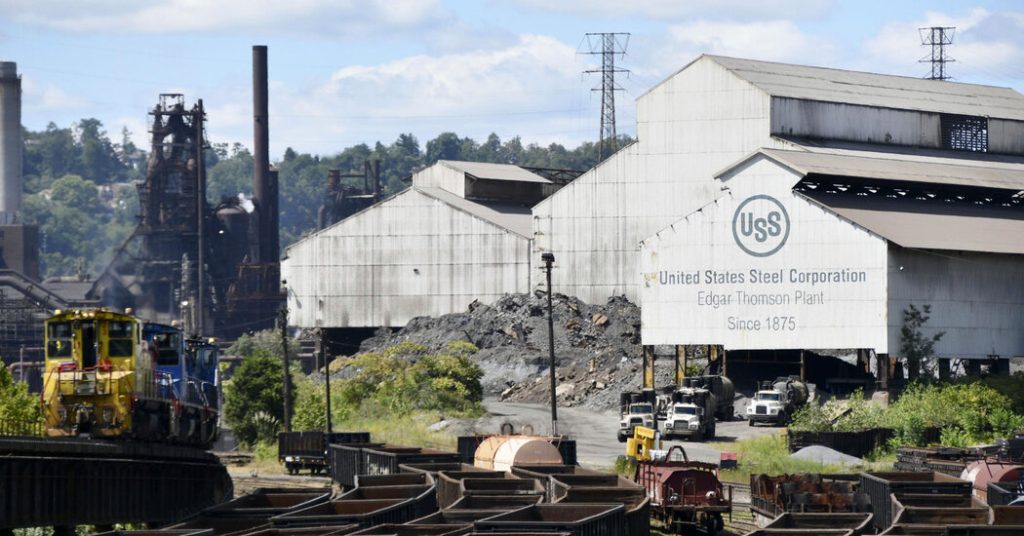President Biden’s decision to block the $14 billion acquisition of U.S. Steel by Nippon Steel of Japan, citing national security concerns, marks a significant departure from traditional American open investment policies and carries potentially far-reaching economic and geopolitical consequences. This assertive use of executive power, particularly so close to the end of his term, underscores the heightened sensitivity surrounding foreign investment in critical industries like steel production, especially in politically significant states like Pennsylvania, where U.S. Steel is headquartered. While the Biden administration emphasized the need to maintain a robust domestically controlled steel industry for national strength, the move has sparked debate about its impact on foreign investment, U.S.-Japan relations, and the future of U.S. Steel itself.
The decision unfolded against a backdrop of election-year politics and intense lobbying from various stakeholders. The powerful United Steelworkers union fiercely opposed the takeover, raising concerns about potential job losses, pension security, and Nippon’s commitment to investing in American plants. These concerns resonated in Pennsylvania, a crucial swing state, and influenced the political discourse surrounding the deal. Both President Biden and then-President-elect Trump publicly advocated for U.S. Steel to remain under American ownership, further complicating the situation and signaling a bipartisan consensus on the issue. The Committee on Foreign Investment in the United States (CFIUS), tasked with reviewing the transaction for national security implications, ultimately declined to offer a formal recommendation, expressing reservations about potential declines in American steel production and the prioritization of Nippon’s global interests over commitments to U.S. Steel. This indecision from CFIUS paved the way for President Biden’s intervention.
Nippon Steel, however, strongly contested CFIUS’s concerns, alleging factual inaccuracies and undue political influence in the review process. The company maintained that the acquisition would bolster U.S. Steel’s competitiveness, preserve jobs, and enable it to better challenge China’s dominance in the global steel market. U.S. Steel’s management also supported the deal, arguing it was crucial for the company’s long-term survival and modernization. This divergence of opinions highlighted the complex economic and strategic considerations at play, pitting national security concerns against the potential benefits of foreign investment and the need to revitalize a struggling American industrial giant.
The political dimensions of the decision are undeniable. Pennsylvania’s status as a swing state, the influence of the United Steelworkers union, and the looming presidential election all contributed to the heightened scrutiny of the deal. While President Biden framed his decision as a matter of national security, critics argue that political calculations played a significant role. The move risks chilling foreign investment in sensitive industries, particularly in politically contested states, as potential acquirers may become wary of navigating the complex and potentially unpredictable political landscape. It also raises concerns about potential retaliatory actions from Japan, a close ally and a major source of foreign investment in the United States.
The future of U.S. Steel remains uncertain. While Nippon had pledged significant investments in U.S. Steel’s facilities and a commitment to maintaining its headquarters in Pittsburgh, the blocked acquisition leaves the company vulnerable to further financial struggles. U.S. Steel’s stock price declined following the announcement, reflecting investor anxiety about the company’s prospects. The company may now be forced to consider alternative strategies, including layoffs, plant closures, or relocating its headquarters, potentially impacting thousands of American jobs and the economic vitality of communities reliant on the steel industry. Other potential buyers might emerge, but the political hurdles and national security concerns demonstrated in this case could deter future investment.
This decision underscores the growing tension between attracting foreign investment to bolster American industries and safeguarding national security in a rapidly changing global economic landscape. The Biden administration’s move sets a precedent for future scrutiny of foreign acquisitions, particularly in sectors deemed critical to national security. The long-term consequences for the American economy, U.S. relations with its allies, and the future of U.S. Steel remain to be seen, but the decision has undoubtedly shifted the landscape for foreign investment in the United States and raised important questions about the balance between economic openness and national security priorities. The case also highlights the significant influence of organized labor and political considerations in shaping economic policy decisions with national security implications. The future will reveal whether this decision strengthens American industry or inadvertently undermines its competitiveness by discouraging foreign investment and innovation.









